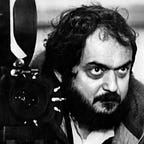How Kubrick’s “2001: A Space Odyssey” Analyses The Idea Of God
Some thoughts on my favorite movie of all time: “2001: A Space Odyssey”
STANLEY KUBRICK’S THEOLOGICAL STATEMENT
In almost all of Kubrick’s movies, the main subject is the human morality and how it affects our species. As we know, Kubrick was not a religious man and he found the idea of God to be absurd and so did Arthur C. Clark, the famous science fiction writer who collaborated with Kubrick in the writing process of “2001: A Space Odyssey”. Even though the both of them were absolute atheists, in “2001” the idea of God is so relevant that one can actually think that it’s the concept behind the whole picture. In that sense, what the movie shows us is not the idea of God meant as a superior being who controls the whole universe, it completely ignores the Christian conception of God. In “2001” we can feel a presence through the whole film but we can’t really tell what it is. Actually, God is not even nominated in the movie. In Kubrick’s and Clarke’s minds, God is more of an entity that is expanded in the whole universe, a being that cannot be seen by human eyes, a substance that envelops everything and everyone, controlling the occurrence of things. In Kubrick’s and Clarke’s minds, the human representation of what we call “God” is wrong and it limits the definition of what “God” really is.
THE SILENCE AS A WAY TO REPRESENT GOD
One of the most important and well known things of “2001: A Space Odyssey” are it’s long lasting silent scenes. Obviously, the choice of making the space sound so silent is due to Kubrick’s obsession for details and as we know the sound in space cannot be propagated. That being said, the beauty of the film is that almost every scene, every frame, every sequence can be interpreted by the each of us in different ways. So what if the silence is the depiction of the idea of God? It may also symbolise God’s Divine Indifference towards humans. The silence becomes very relevant in the film, in fact, after the first act, the whole movie takes it’s time to depict deep space in the most accurate way possible. The long lasting breath of the astronauts followed by H.A.L. 9000’s creepy looks, makes the silence resonate even more. Since the start of the film, the presence of something is almost palpable but we can’t understand what that strange feeling is because the film itself doesn’t say anything about it and, more importantly, we just don’t see it. In that sense, the silence could interpreted as the only way “God” speaks to us. If anyone’s interested, this argument is vastly analysed in Martin Scorsese’s 2016 film “Silence”, a true masterpiece if you ask me.
THE LAST 10 MINUTES
The last 10 minutes of “2001: A Space Odyssey” are the most talked about, analysed, critiqued and famous last 10 minutes of Cinema History. Through the years there have been many critics that have analysed the final sequence of the movie, there have been many and many different opinions about it, but there was one thing that was clear to everyone: those final 10 minutes can be all or nothing, depending on one’s personal perspective. In my opinion, the last sequence of “2001” is the key to understand the film and it also helps to understand Kubrick’s philosophy through his whole filmography. That being said, let’s jump into my analysis. The end of film starts with the well known dreamlike sequence. Dave’s spaceship is being transported through a tunnel of flashy images for a good 2 minutes before the “landing”. My interpretation of those two minutes is that they might represent a sort of divine fertilisation. The spaceship is the seed and the whole “tunnel” is the uterus, while the bright colours and vivid images are the orgasm. After this sequence, Dave finally lands on what seems to be an Earth-like place, a hall resembling human architecture. After seeing Dave’s surprised face, we go through another very strange sequence which represents Dave’s aging. Through the whole sequence, we can see a lot objects which are clearly human-made but it seems like the creator of the room didn’t really know human history as all items come from different periods of our history. This might again prompt to the existence of an entity which one could call “God”, and, once again, it might also represent the Divine Indifference of “God” towards humans. After the “aging-sequence”, Dave sees the monolith that appears in the first minutes of the movie(I won’t delve into this topic today because I’m planning to write a stand-alone article about this argument). As we look through the monolith, the latter leads us to the space and there we can a strange baby almost wrapped in a white aura. My interpretation is that the baby we see, which obviously is Dave, is the result of the fertilisation we saw before. The movies then ends, leaving us to think about what that baby could represent.
FINAL CONSIDERATIONS
What I really got from “2001: A Space Odyssey” is that the whole idea of God being represented as a human-like creature is absurd. I vastly agree with Kubrick’s and Clarke’s vision of what one could call “God”. The Universe itself is what we call “God” and the reason of existence is the Universe’s inexplicable need to generate things and living beings. The meaning behind this is far away from human comprehension and trying to understand “God”’s will is impossible and has no use to it.
